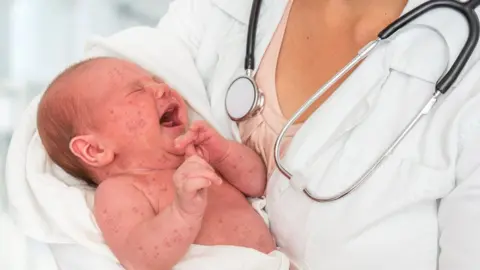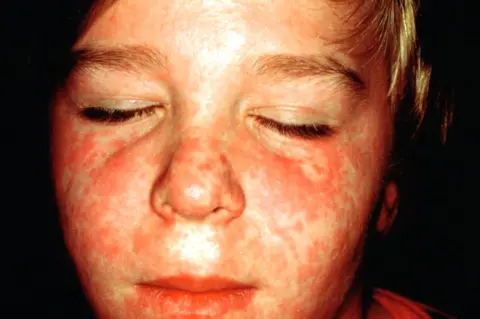Measles: Greater Manchester outbreak rises to 47 cases
 Getty Images
Getty ImagesMore measles cases have been confirmed in Greater Manchester so far this year than in the whole of the previous two years combined.
Public Health England (PHE) said there had been 47 cases across Greater Manchester in 2019, compared to only three cases in 2018 and seven in 2017.
Doctors have urged people to make sure they and their children are vaccinated against the contagious disease.
Cases are predominantly in unvaccinated children, said Will Welfare from PHE.
Mr Welfare said uptake of vaccinations was "not high enough" and this has "really been illustrated" by the "huge increase" during this recent outbreak.
The North West had 22 confirmed cases in 2018 and 43 in 2017, meaning Greater Manchester alone has already surpassed the previous totals for the entire region.
 Science Photo Library
Science Photo Library
Measles symptoms:
- cold-like symptoms - runny nose, sneezing
- signs the body is fighting infection - high fever, tiredness, loss of appetite, muscle aches
- red, watery eyes (conjunctivitis)
- greyish spots in the mouth
- red, raised spots that may merge together becoming blotchy, starting around the hairline two to four days after the initial symptoms, then spreading down over the head, neck and rest of the body
Find more NHS information on measles here.

The MMR vaccine can prevent infection but discredited research 20 years ago that erroneously linked MMR to autism has stopped some people from trusting the vaccine.
Mr Welfare said the "unfounded concerns... resulted in a reduction in the MMR uptake but we have shown that the MMR vaccine is safe and incredibly effective".
The government's chief medical advisor Prof Dame Sally Davies has urged parents to ignore "social media fake news" and to get their children vaccinated.
The NHS recommends all children receive the MMR around their first birthday and then just before they start school.
Measles is a highly contagious disease that in severe cases can lead to complications including blindness, pneumonia and infection and swelling of the brain.
Last year saw the number of cases across England more than triple to 966 from 259 in 2017.
The number of cases in Europe also tripled between 2017 and 2018 to 82,596, according to the World Health Organization.
